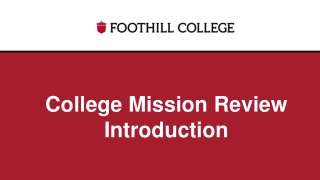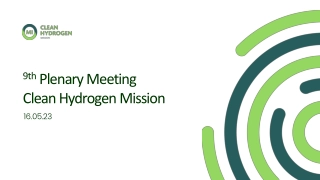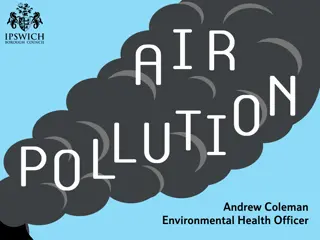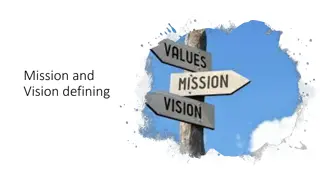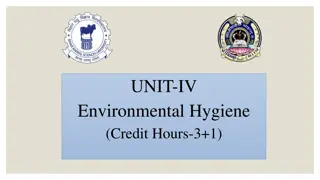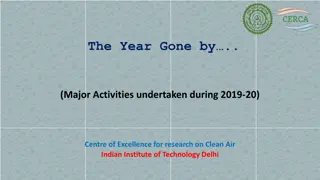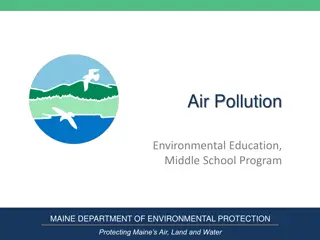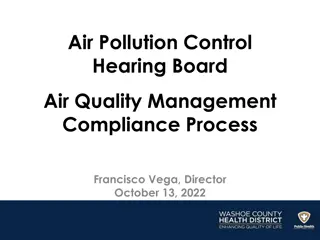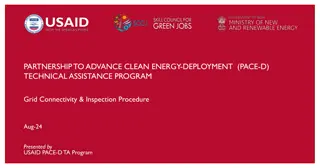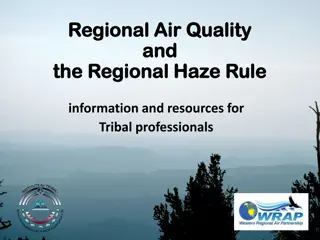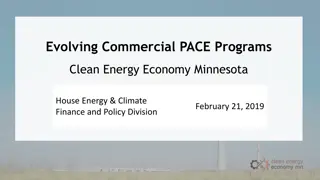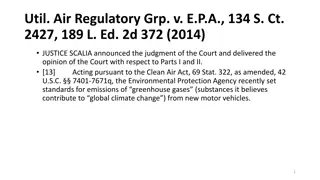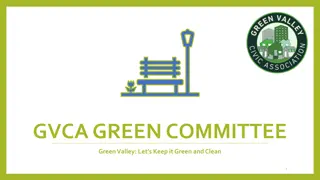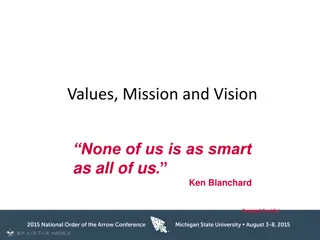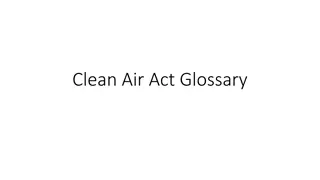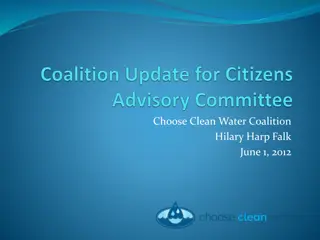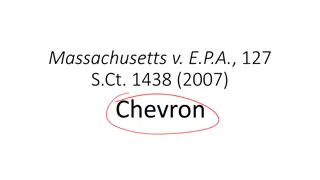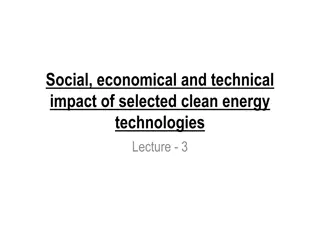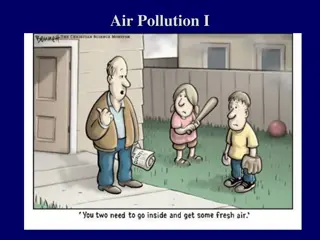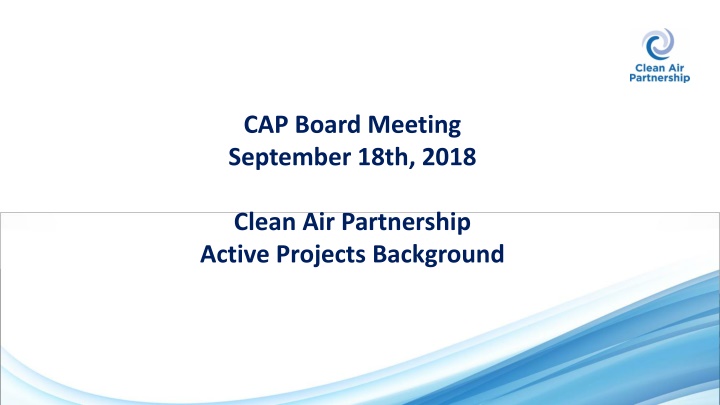
Clean Air Partnership Vision and Mission
Clean Air Partnership (CAP) envisions sustainable, resilient, vibrant communities with healthy air, efficient low carbon energy use, and transportation systems prioritizing low or zero carbon emissions. Their mission is to facilitate municipalities in becoming sustainable, resilient communities by improving air quality, reducing greenhouse gas emissions, and increasing participation in the low carbon economy to address climate change and improve Canadian lives. CAP also aims to advance public understanding of climate change, accelerate air quality improvements, and promote global climate stabilization through collaboration, policy integration, research, and scaling up initiatives.
Download Presentation

Please find below an Image/Link to download the presentation.
The content on the website is provided AS IS for your information and personal use only. It may not be sold, licensed, or shared on other websites without obtaining consent from the author. If you encounter any issues during the download, it is possible that the publisher has removed the file from their server.
You are allowed to download the files provided on this website for personal or commercial use, subject to the condition that they are used lawfully. All files are the property of their respective owners.
The content on the website is provided AS IS for your information and personal use only. It may not be sold, licensed, or shared on other websites without obtaining consent from the author.
E N D
Presentation Transcript
CAP Board Meeting September 18th, 2018 Clean Air Partnership Active Projects Background
CAP Vision The Clean Air Partnership (CAP) has a vision of sustainable, resilient and vibrant communities with: Healthy air; Efficient low carbon energy use; Transportation systems that prioritize low or zero carbon emission mobility options such as walking, cycling, and transit Increasing resilience to climate change impacts; and Increasing jobs from low carbon and green infrastructure investments.
CAP Mission CAP facilitates the ability of municipalities to become sustainable, resilient, and vibrant communities by advancing efforts to improve air quality, reducing greenhouse gas emissions, and increasing participation in the low carbon economy in order to address climate change and improve the lives of all Canadians.
CAPs Purpose 1. To advance public understanding of climate change and air quality problems and their implications for public health and the urban environment. 2. To advance air quality improvements and global climate stabilization via the reduction of greenhouse gas emissions into the atmosphere through public education, policy research, barrier removal. 3. To accelerate the transfer and implementation of projects related to energy conservation and efficiency, global climate stabilization and air quality improvement, including projects promoting the creation and preservation of carbon sinks.
CAPs Value Proposition Collaboration: We bring together experts and practitioners to share their experiences, minimize redundancy and maximize use of resources. Policy Integration: CAP encourages cooperation among the different silos of government to improve the implementation of multi-faceted policies. Research Into Action: CAP conducts research and distills results and emerging knowledge into easily accessible formats. Scaling Up: CAP facilitates the advancement from pilot project stage to wider adoption by bringing innovation to scale to broaden and deepen impact of a measure, program, or technology.
Clean Air Council Need to develop 2019 2023 Clean Air Council Inter-governmental Declaration on Clean Air AND Climate Change Great opportunity to seek feedback on gathering feedback from CAC on how CAP s Strategic Directions could inform the direction of the CAC Declaration Could be a good opportunity for a refresh of the CAC Declaration. 185K in 2018 About that same amount secured for future years
PCP - Partners for Climate Protection 2018 Workplan Focus on Milestone Advancement Communities of Practice to support implementation of actions Capacity Building for qualitative analysis and communications of co- benefits; as well as for Financing and Business Plan development for community climate actions Streamlining and navigating funding sources for municipalities Approx 95 K for April 1st, 2018 till March 31st 2019. CAP-47K; OCC-12K;OCCIAR-17K; Contract with Ralph Torrie-4K; Travel- 10K
CCCS- International Scan of Climate Services Literature Review: conduct a comprehensive literature review to identify the range of climate information currently in use nationally and internationally, the range of climate information providers, and the frameworks in place to ensure consistency and accuracy in climate information. Jurisdictional Scan: examine the range of portals in existence, the services they offer, the information they provide, the documentation they provide to assist with interpretation, and their target users. Interview Series: identify at least 5 non-Canadian climate service providers and conduct an in-depth structured interview. Recommendations: deliver draft recommendations for CCCS s consideration Budget: 24,800K in 2018. Project to be completed in 2018.
HC - Urban Heat Island Case Study lead production of a final draft guidance document with tips, approaches and case studies that can help health professionals as they support local governments and organizations with reducing urban heat islands. Will include an introduction to heat islands, different ideas and approaches for how health professionals can assist local governments, and several case studies highlighting local UHI mitigation tools and activities. Will also provide advice for reducing outdoor temperatures 24 K in 2018. Project to be completed in 2018.
Toronto Centre for Action Transportation Active Neighbourhoods Canada: 3 communities; engagement; identify desired change; work with community to implement desired change; document and disseminate process, lessons learned, etc. Budget: 123K for 2018 (secured for 2 additional years 2019 & 2020) Accelerating Scarbourough Cycles: Sustain and accelerate the success of Scarborough Cycles: building bike culture beyond downtown project 144K ends in March 2019; 44K other partners; 100K CAP Bike Parking Study: Investigating the Feasibility of Non-Profit Operations of Bike Stations and Lockers: 30K (to be completed in 2018)
Municipal Champions: Possible Municipal Leaders for Climate Action Project Key barriers identified by municipal staff include: lack of staff capacity (limited staff); lack of support from council (re: budget/staff allocations, policy implementation support); lack of support from senior management This Needs Assessment explored the possible value of a municipal climate champions network to help advance support/capacity at the Council level. Thought council support would be a valuable asset to building senior management support. The main purpose of the needs assessment was to determine if there exists an interest on the part of elected officials to a) advance GHG reduction within their communities; and b) participate in a network with peers to facilitate this advancement. 30K to be completed in 2018 but seeking funds for future and ongoing work.
Energy Community of Practice QUEST and CAP working together on this project Goal is to identify and test opportunities to improve the alignment between community energy planning process, the IESO s regional planning process, and utility planning (conservation, distribution, asset management). Identification of six recommendations provide opportunities to move towards greater planning alignment: Mutually aligning around common objectives Enhancing engagement and plan review Greater data sharing and assumption consistency Collaborating on energy mapping and spatial targeting of programs Focusing on peak demand reduction and avoided cost planning Aligning incentives and financial mechanisms 11K ends at end of 2018
Co-Op and Municipal Matchmaking When it comes to advancing distributed energy projects two key barriers municipalities face is: financing and lack on community engagement Two things co-ops are good at: getting investments and community engagement in the form of distributed energy support in the most real sense of the term. Putting community money to it. Municipalities and co-ops have not worked together in the distributed energy world (through FIT) Is there enough of a fit between the two where a partnership would make sense? Key questions: where have municipality/coop partnerships taken place and what can we learn from those? What does a municipality need to do to create a supportive co-op environment for fundraising of community investors? What would be the conditions to secure community investors? How can co-ops play a role in project development and delivery? 15K in 2018 (ends at end of 2018)
Potential Future Projects Transition 2050: Made it passed the EOI stage. Just submitted the proposal on Sept 13. Implementation peer-to-peer teams on advancing green development standards, Home energy retrofit and cooperate municipal actions (building retrofits and fleets) Simcoe County Active Transportation RFP. Advancing AT within Simcoe County RFP. Policy and Action Opportunities RFP was successful Municipal Leaders Network Shopping it around to gather foundation perspective on it.
Funding rejections Ontario Trillium Foundation: a smartphone application that engages citizens in City-led street design/rehabilitation projects in order to encourage awareness of the complete streets opportunities and visualizations. Local Improvement Charge Energy Retrofit Pilot Project GreenON Challenge Fund and Low Carbon Challenge Fund (Green ON has become Green OFF)

